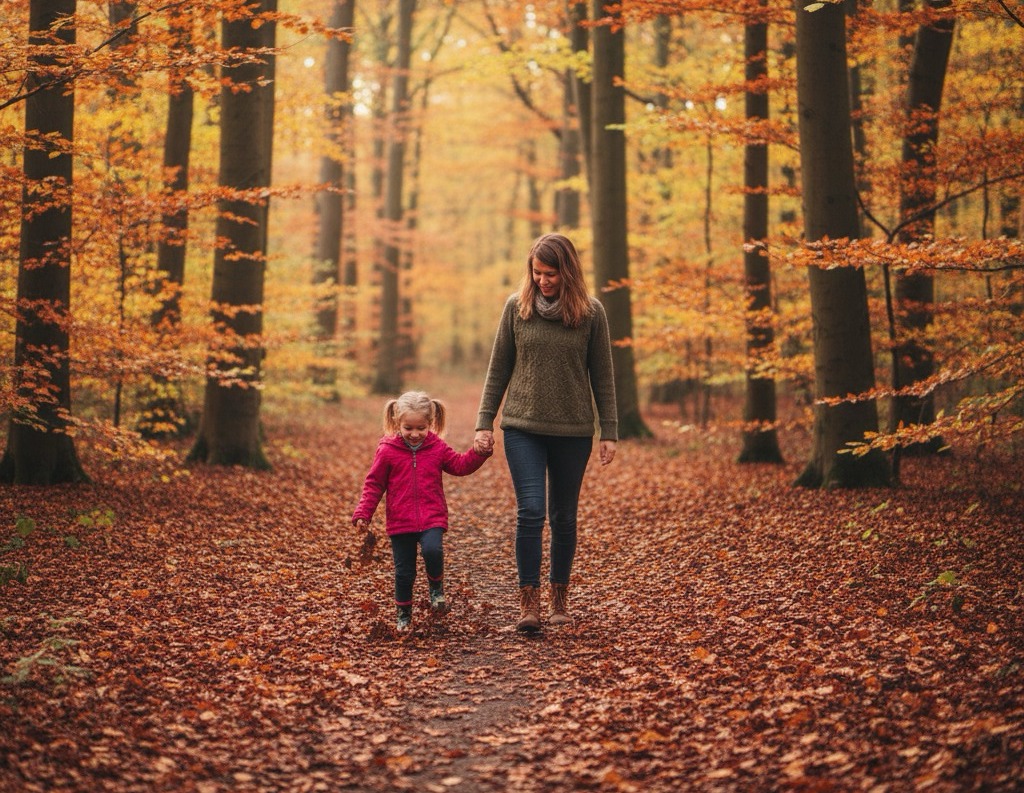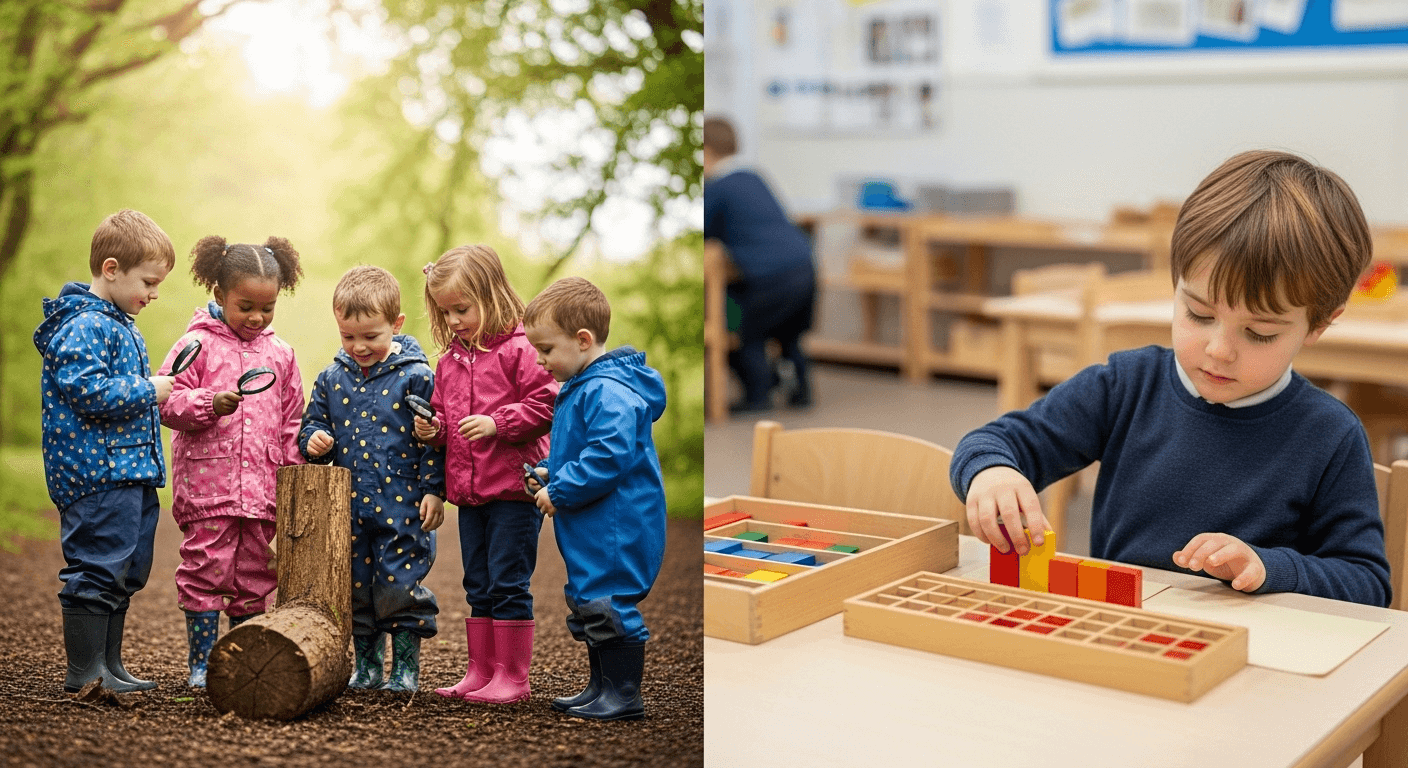· Educational Benefits · 7 min read
Forest School for Beginners: 5 Key Benefits Your Child Will Experience
Curious about Forest School? If you're new to the idea, discover 5 key, practical benefits your child can gain, from confidence and resilience to social and physical skills.

You may be starting to explore educational and developmental activities for your child. Perhaps you’ve heard people talking about Forest School, and you’re wondering what it’s all about, and, more importantly, what your child would actually get out of it. It’s easy to assume it’s just about getting fresh air, but the Forest School approach is designed to deliver much more. If you’re looking for the core forest school benefits for beginners, and asking yourself why choose forest school, this guide breaks it down. It moves beyond the mud and the leaves to explain the real learning that happens. There are many outdoor learning advantages, and Forest School harnesses them in a unique way.
Let’s look at five key benefits your child is likely to experience.
1. Growing Genuine Confidence and Self-Esteem
Confidence isn’t something you can teach from a book. It grows from experience, trust, and achievement. Forest School provides the perfect environment for this. How does this happen?
- Being Trusted: Trained leaders create a safe environment where children can be trusted to undertake real tasks. They might, under close, expert supervision, be introduced to using real tools (such as potato peelers for whittling, or small saws), or learn about fire safety around a carefully managed campfire. Being given this responsibility, and trusted to manage it, sends a powerful message: “You are capable”.
- Mastering New Skills: Learning to tie a useful knot, successfully building a shelter that stands up, or managing to climb a little higher on a tree gives a child a genuine, earned sense of accomplishment. Forest School is full of achievable challenges. Success builds a strong belief in their own abilities.
- Making Choices: Much of the activity is child-led. Allowing a child to choose what they explore, how they approach a task, or what they want to build, validates their ideas and gives them a sense of ownership over their learning.
- Contributing: Children often work together, and seeing their contribution help the group achieve a goal (like finding the right-sized branches for a den) builds their sense of value and belonging. Developing self-esteem in this way creates a positive foundation for all other areas of learning. Confident children are more willing to try new things and to have a go.
2. Developing Resilience and Problem-Solving
Life involves setbacks, and learning how to cope with challenges and keep going is a vital skill. Forest School nurtures resilience, not by removing all obstacles, but by supporting children as they learn to navigate them. How does this happen?
- Working Through Problems: Things don’t always work first time in a natural environment. A den structure might be wobbly; a knot might come undone; a desired branch might be out of reach. Forest School gives children the time and space to try a different approach, to think through the problem, and to persevere. The leader acts as a facilitator, perhaps asking questions (“What else could you try?”) rather than just giving the answer.
- Experiencing Natural Consequences: Children learn, in a supported way, that if they don’t put their gloves on, their hands will get cold, or that if a shelter isn’t built carefully, the rain might come in. Working through these minor, low-risk challenges helps them think ahead and adapt.
- Taking Supported Risks: Learning to assess a situation – Is that log safe to walk on? How high can I safely climb? – is a critical skill. Forest School is risk-aware, not risk-averse. Leaders support children in learning how to identify and manage appropriate levels of risk. This teaches judgement and self-awareness, which builds resilience and competence.
- Coping with Change: The outdoor environment is always changing – the weather, the seasons. Children learn to adapt, to dress appropriately, and to enjoy the environment in all its moods. This builds flexibility. Resilience is crucial for mental wellbeing and helps children manage the normal ups-and-downs they will face in school and in life.
3. Improving Social Skills and Collaboration
Working and playing alongside others is a skill that needs practice. The shared, practical tasks common in Forest School provide constant, meaningful opportunities for social development. How does this happen?
- Shared Goals: Many activities require teamwork. Building a large shelter, carrying a heavy log, or playing a group game requires children to work together.
- Negotiation and Communication: During group tasks, children need to share ideas, listen to others, decide on roles, and share tools. They learn to explain their own viewpoint and to take the needs and views of others into account.
- Developing Empathy: Children work in close proximity. They learn to look out for each other, to help someone who is struggling, and to care for the plants and creatures in the woodland environment.
- Conflict Resolution: Disagreements happen. With the support of the Forest School leader, children learn how to navigate these conflicts, express their feelings constructively, and find compromises. These interactions help children build positive relationships and learn how to operate successfully as part of a group.
4. Boosting Physical Skills and Enjoying Activity
Forest School sessions involve a lot of movement, naturally encouraging physical development in a fun, engaging way that develops both large and small muscle groups. How does this happen?
- Gross Motor Skills: The outdoor environment naturally encourages large movements. Children improve their balance, coordination, and strength through:
- Walking, running and navigating uneven ground.
- Climbing trees or scrambling over logs.
- Carrying, lifting, and dragging branches and materials.
- Digging, building, and swinging.
- Fine Motor Skills: Children also develop dexterity and hand-eye coordination through:
- Handling, examining and sorting small natural objects like pebbles, leaves and seeds.
- Tying knots.
- Using tools, like peelers or hand-drills, requiring careful control.
- Creating crafts using natural materials.
- Health and Wellbeing: Simply being physically active in the fresh air, whatever the weather, benefits physical health. Many children develop stamina and an enjoyment of physical activity that stays with them. These are key outdoor learning advantages.
5. Fostering a Connection with Nature, Curiosity and Wellbeing
In an increasingly screen-based world, Forest School gives children regular, direct, sensory contact with the natural world. This has profound benefits. How does this happen?
- Direct, Sensory Experience: Children are encouraged to use all their senses. They feel the textures of bark and moss, smell the damp earth, see the intricate patterns in a leaf, and hear birdsong or the wind. This builds a rich, tangible connection.
- Knowledge and Understanding: Through observation and guidance, children learn to identify common trees, plants, insects, and birds. They witness the cycles of the seasons first-hand, seeing how the woodland changes through the year.
- Inspiring Curiosity: Nature is inherently interesting. Finding an unusual fungi, a strange-looking insect, or a track in the mud sparks questions and a desire to learn. Forest School encourages this inquisitiveness, which is the foundation of scientific enquiry.
- Respect and Stewardship: Developing a positive relationship with nature fosters a desire to care for it. Children learn to respect the environment and the creatures within it.
- Mental Wellbeing: Numerous studies show that spending time in nature can reduce stress and anxiety, and improve mood and concentration. The calm of the woods can have a hugely positive impact.
These are just some of the core forest school benefits for beginners to consider. For parents wondering why choose forest school, the answer lies in its power to develop the whole child. It builds the confidence, resilience, social awareness, and physical competence that children need. It complements academic learning by fostering curiosity, creativity and a positive, can-do attitude. It offers powerful outdoor learning advantages within a proven, supportive, and nurturing framework. It’s an investment in skills for life.



